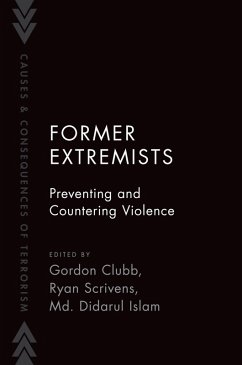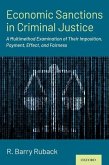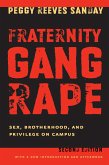Former Extremists
Preventing and Countering Violence
Herausgeber: Clubb, Gordon; Islam, MD Didarul; Scrivens, Ryan
42,99 €
inkl. MwSt.
**Unverbindliche Preisempfehlung des Herstellers
Versandkostenfrei*Versandfertig in über 4 Wochen

21 °P sammeln
Former Extremists
Preventing and Countering Violence
Herausgeber: Clubb, Gordon; Islam, MD Didarul; Scrivens, Ryan
- Broschiertes Buch
- Merkliste
- Auf die Merkliste
- Bewerten Bewerten
- Teilen
- Produkt teilen
- Produkterinnerung
- Produkterinnerung
This collection captures a variety of controversial and contested work that former extremists and combatants engaged in across a range of contexts, broadly divided into three themes on their effectiveness, ethical considerations, and implementation. Written by a group of authors from a wide range of backgrounds and experiences, the book not only captures an ongoing policy debate but also contributes to the future direction of work involving Formers in violence prevention.
Andere Kunden interessierten sich auch für
![Proto-State Media Systems Proto-State Media Systems]() Carol WinklerProto-State Media Systems57,99 €
Carol WinklerProto-State Media Systems57,99 €![Intellectual Disability Intellectual Disability]() Michael ChafetzIntellectual Disability80,99 €
Michael ChafetzIntellectual Disability80,99 €![Economic Sanctions in Criminal Justice Economic Sanctions in Criminal Justice]() R Barry RubackEconomic Sanctions in Criminal Justice72,99 €
R Barry RubackEconomic Sanctions in Criminal Justice72,99 €![Violent States and Creative States (Volume 2) Violent States and Creative States (Volume 2)]() Violent States and Creative States (Volume 2)64,99 €
Violent States and Creative States (Volume 2)64,99 €![Studies in Personality, Social and Clinical Psychology Studies in Personality, Social and Clinical Psychology]() Russell EisenmanStudies in Personality, Social and Clinical Psychology54,99 €
Russell EisenmanStudies in Personality, Social and Clinical Psychology54,99 €![Fraternity Gang Rape Fraternity Gang Rape]() Peggy Reeves SandayFraternity Gang Rape32,99 €
Peggy Reeves SandayFraternity Gang Rape32,99 €![Psychopathy Psychopathy]() Morten Birket-Smith / Theodore Millon / Erik SimonsenPsychopathy73,99 €
Morten Birket-Smith / Theodore Millon / Erik SimonsenPsychopathy73,99 €-
-
-
This collection captures a variety of controversial and contested work that former extremists and combatants engaged in across a range of contexts, broadly divided into three themes on their effectiveness, ethical considerations, and implementation. Written by a group of authors from a wide range of backgrounds and experiences, the book not only captures an ongoing policy debate but also contributes to the future direction of work involving Formers in violence prevention.
Hinweis: Dieser Artikel kann nur an eine deutsche Lieferadresse ausgeliefert werden.
Hinweis: Dieser Artikel kann nur an eine deutsche Lieferadresse ausgeliefert werden.
Produktdetails
- Produktdetails
- Verlag: Oxford University Press
- Seitenzahl: 344
- Erscheinungstermin: 29. Oktober 2024
- Englisch
- Abmessung: 235mm x 158mm x 20mm
- Gewicht: 490g
- ISBN-13: 9780197765074
- ISBN-10: 0197765076
- Artikelnr.: 68319788
- Herstellerkennzeichnung
- Libri GmbH
- Europaallee 1
- 36244 Bad Hersfeld
- gpsr@libri.de
- Verlag: Oxford University Press
- Seitenzahl: 344
- Erscheinungstermin: 29. Oktober 2024
- Englisch
- Abmessung: 235mm x 158mm x 20mm
- Gewicht: 490g
- ISBN-13: 9780197765074
- ISBN-10: 0197765076
- Artikelnr.: 68319788
- Herstellerkennzeichnung
- Libri GmbH
- Europaallee 1
- 36244 Bad Hersfeld
- gpsr@libri.de
Gordon Clubb is an Associate Professor at the University of Leeds. He has written several publications on de-radicalization and has been regularly invited to present research to international practitioner audiences. He has conducted research on the role of "Formers" in countering violent extremism and peacebuilding. Another dimension of his work looks at how de-radicalization programs can generate positive public relations and how community support for reintegration of ex-extremists can be facilitated through messaging and transparency. Ryan Scrivens is an Assistant Professor in the School of Criminal Justice at Michigan State University. He is also an Associate Director at the International CyberCrime Research Centre at Simon Fraser University and a Research Fellow at the VOX-Pol Network of Excellence. He conducts problem-oriented interdisciplinary research with a focus on terrorists' and extremists' use of the Internet, right-wing terrorism and extremism, and combating violent extremism. Md. Didarul Islam is an Assistant Professor at the Department of World Religions and Culture, University of Dhaka. He is a commonwealth scholar pursuing his Doctoral Studies at the School of Politics and International Studies, University of Leeds. His doctoral research focuses on how a norm receiving state frames and formulates Countering Violent Extremism (CVE) policy from a public policy perspective. His research interests include CVE, counterterrorism, radicalization, international security, public policy, migration, and religion and politics.
* Introduction
* Gordon Clubb, Ryan Scrivens and Md. Didarul Islam
* Section 1: Academic Perspectives
* Chapter 1: Understanding the Effectiveness of Formers: Contexts and
Measurements
* Daniel Koehler
* Chapter 2: "Informed Informants": An Empirical Exploration of Using
Formers within P/CVE Work in the UK
* Suraj Lakhani
* Chapter 3: Being a Former, Becoming a Mentor, and the Value of Using
Formers in the Swedish Exit Program
* Tina Wilchen Christensen
* Chapter 4: Moral Injury, Moral Blindness, Political Non-Repentance:
Former ETA Members and Prevention and Countering Violent Extremism
* Rogelio Alonso
* Chapter 5: Former Extremists in North American Research
* Ryan Scrivens, Steven Windisch, and Pete Simi
* Chapter 6: "Informative, Shocking, Entertaining": Two Decades of
Talks by Former Extremists in German Schools
* Maria Walsh and Antje Gansewig
* Chapter 7: The Role of Former Northern Irish Combatants in Building
Peace and Preventing Violence: Community and Combatant Perspectives
* Neil Ferguson and Patrick Flack
* Chapter 8: Missed Potential for Former Fighters' Involvement in
Conflict Prevention: The Case of Burundi
* Guðrún Sif Friðriksdóttir
* Chapter 9: Do Former Child Soldiers Have a Role in Peacebuilding in
Colombia?
* Patrícia Nabuco Martuscelli and Rafael Duarte Villa
* Section 2: Practitioner Perspectives
* Chapter 10: Formers in Lebanon
* Christina Foerch and Julie M. Norman
* Chapter 11: Transitioning from Former Violent Extremist to Exit Peer
Specialist
* Katharina Meredith and Robert Örell
* Chapter 12: Collaboration with Former Extremists
* Lynn Davies
* Chapter 13: How I Understand the Role of Former as a Former Turned
Activist
* Mubin Shaikh
* Chapter 14: Former Extremists as Peer Mentors in P/CVE
* Sara Winegar Budge
* Chapter 15: Life after Hate
* Brad Galloway
* Chapter 16: From Former to Practitioner
* Chris Buckley
* Chapter 17: The Ethical Imperatives of Engaging Formers in P/CVE
Efforts
* Ross Frenett
* Conclusion: Norms and Standards for Formers Engaging in Violence
Prevention
* Gordon Clubb, Ryan Scrivens and Md. Didarul Islam
* Gordon Clubb, Ryan Scrivens and Md. Didarul Islam
* Section 1: Academic Perspectives
* Chapter 1: Understanding the Effectiveness of Formers: Contexts and
Measurements
* Daniel Koehler
* Chapter 2: "Informed Informants": An Empirical Exploration of Using
Formers within P/CVE Work in the UK
* Suraj Lakhani
* Chapter 3: Being a Former, Becoming a Mentor, and the Value of Using
Formers in the Swedish Exit Program
* Tina Wilchen Christensen
* Chapter 4: Moral Injury, Moral Blindness, Political Non-Repentance:
Former ETA Members and Prevention and Countering Violent Extremism
* Rogelio Alonso
* Chapter 5: Former Extremists in North American Research
* Ryan Scrivens, Steven Windisch, and Pete Simi
* Chapter 6: "Informative, Shocking, Entertaining": Two Decades of
Talks by Former Extremists in German Schools
* Maria Walsh and Antje Gansewig
* Chapter 7: The Role of Former Northern Irish Combatants in Building
Peace and Preventing Violence: Community and Combatant Perspectives
* Neil Ferguson and Patrick Flack
* Chapter 8: Missed Potential for Former Fighters' Involvement in
Conflict Prevention: The Case of Burundi
* Guðrún Sif Friðriksdóttir
* Chapter 9: Do Former Child Soldiers Have a Role in Peacebuilding in
Colombia?
* Patrícia Nabuco Martuscelli and Rafael Duarte Villa
* Section 2: Practitioner Perspectives
* Chapter 10: Formers in Lebanon
* Christina Foerch and Julie M. Norman
* Chapter 11: Transitioning from Former Violent Extremist to Exit Peer
Specialist
* Katharina Meredith and Robert Örell
* Chapter 12: Collaboration with Former Extremists
* Lynn Davies
* Chapter 13: How I Understand the Role of Former as a Former Turned
Activist
* Mubin Shaikh
* Chapter 14: Former Extremists as Peer Mentors in P/CVE
* Sara Winegar Budge
* Chapter 15: Life after Hate
* Brad Galloway
* Chapter 16: From Former to Practitioner
* Chris Buckley
* Chapter 17: The Ethical Imperatives of Engaging Formers in P/CVE
Efforts
* Ross Frenett
* Conclusion: Norms and Standards for Formers Engaging in Violence
Prevention
* Gordon Clubb, Ryan Scrivens and Md. Didarul Islam
* Introduction
* Gordon Clubb, Ryan Scrivens and Md. Didarul Islam
* Section 1: Academic Perspectives
* Chapter 1: Understanding the Effectiveness of Formers: Contexts and
Measurements
* Daniel Koehler
* Chapter 2: "Informed Informants": An Empirical Exploration of Using
Formers within P/CVE Work in the UK
* Suraj Lakhani
* Chapter 3: Being a Former, Becoming a Mentor, and the Value of Using
Formers in the Swedish Exit Program
* Tina Wilchen Christensen
* Chapter 4: Moral Injury, Moral Blindness, Political Non-Repentance:
Former ETA Members and Prevention and Countering Violent Extremism
* Rogelio Alonso
* Chapter 5: Former Extremists in North American Research
* Ryan Scrivens, Steven Windisch, and Pete Simi
* Chapter 6: "Informative, Shocking, Entertaining": Two Decades of
Talks by Former Extremists in German Schools
* Maria Walsh and Antje Gansewig
* Chapter 7: The Role of Former Northern Irish Combatants in Building
Peace and Preventing Violence: Community and Combatant Perspectives
* Neil Ferguson and Patrick Flack
* Chapter 8: Missed Potential for Former Fighters' Involvement in
Conflict Prevention: The Case of Burundi
* Guðrún Sif Friðriksdóttir
* Chapter 9: Do Former Child Soldiers Have a Role in Peacebuilding in
Colombia?
* Patrícia Nabuco Martuscelli and Rafael Duarte Villa
* Section 2: Practitioner Perspectives
* Chapter 10: Formers in Lebanon
* Christina Foerch and Julie M. Norman
* Chapter 11: Transitioning from Former Violent Extremist to Exit Peer
Specialist
* Katharina Meredith and Robert Örell
* Chapter 12: Collaboration with Former Extremists
* Lynn Davies
* Chapter 13: How I Understand the Role of Former as a Former Turned
Activist
* Mubin Shaikh
* Chapter 14: Former Extremists as Peer Mentors in P/CVE
* Sara Winegar Budge
* Chapter 15: Life after Hate
* Brad Galloway
* Chapter 16: From Former to Practitioner
* Chris Buckley
* Chapter 17: The Ethical Imperatives of Engaging Formers in P/CVE
Efforts
* Ross Frenett
* Conclusion: Norms and Standards for Formers Engaging in Violence
Prevention
* Gordon Clubb, Ryan Scrivens and Md. Didarul Islam
* Gordon Clubb, Ryan Scrivens and Md. Didarul Islam
* Section 1: Academic Perspectives
* Chapter 1: Understanding the Effectiveness of Formers: Contexts and
Measurements
* Daniel Koehler
* Chapter 2: "Informed Informants": An Empirical Exploration of Using
Formers within P/CVE Work in the UK
* Suraj Lakhani
* Chapter 3: Being a Former, Becoming a Mentor, and the Value of Using
Formers in the Swedish Exit Program
* Tina Wilchen Christensen
* Chapter 4: Moral Injury, Moral Blindness, Political Non-Repentance:
Former ETA Members and Prevention and Countering Violent Extremism
* Rogelio Alonso
* Chapter 5: Former Extremists in North American Research
* Ryan Scrivens, Steven Windisch, and Pete Simi
* Chapter 6: "Informative, Shocking, Entertaining": Two Decades of
Talks by Former Extremists in German Schools
* Maria Walsh and Antje Gansewig
* Chapter 7: The Role of Former Northern Irish Combatants in Building
Peace and Preventing Violence: Community and Combatant Perspectives
* Neil Ferguson and Patrick Flack
* Chapter 8: Missed Potential for Former Fighters' Involvement in
Conflict Prevention: The Case of Burundi
* Guðrún Sif Friðriksdóttir
* Chapter 9: Do Former Child Soldiers Have a Role in Peacebuilding in
Colombia?
* Patrícia Nabuco Martuscelli and Rafael Duarte Villa
* Section 2: Practitioner Perspectives
* Chapter 10: Formers in Lebanon
* Christina Foerch and Julie M. Norman
* Chapter 11: Transitioning from Former Violent Extremist to Exit Peer
Specialist
* Katharina Meredith and Robert Örell
* Chapter 12: Collaboration with Former Extremists
* Lynn Davies
* Chapter 13: How I Understand the Role of Former as a Former Turned
Activist
* Mubin Shaikh
* Chapter 14: Former Extremists as Peer Mentors in P/CVE
* Sara Winegar Budge
* Chapter 15: Life after Hate
* Brad Galloway
* Chapter 16: From Former to Practitioner
* Chris Buckley
* Chapter 17: The Ethical Imperatives of Engaging Formers in P/CVE
Efforts
* Ross Frenett
* Conclusion: Norms and Standards for Formers Engaging in Violence
Prevention
* Gordon Clubb, Ryan Scrivens and Md. Didarul Islam







